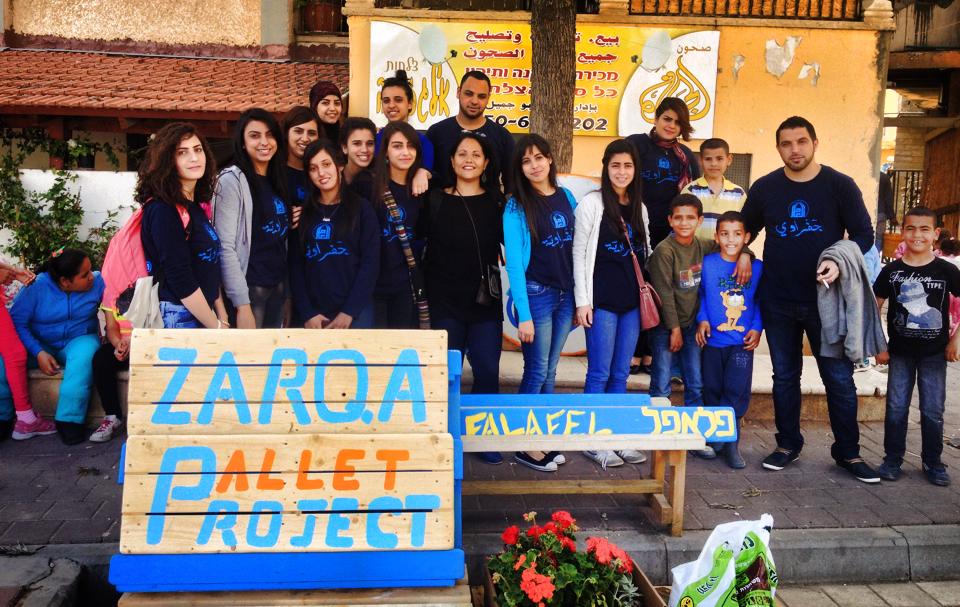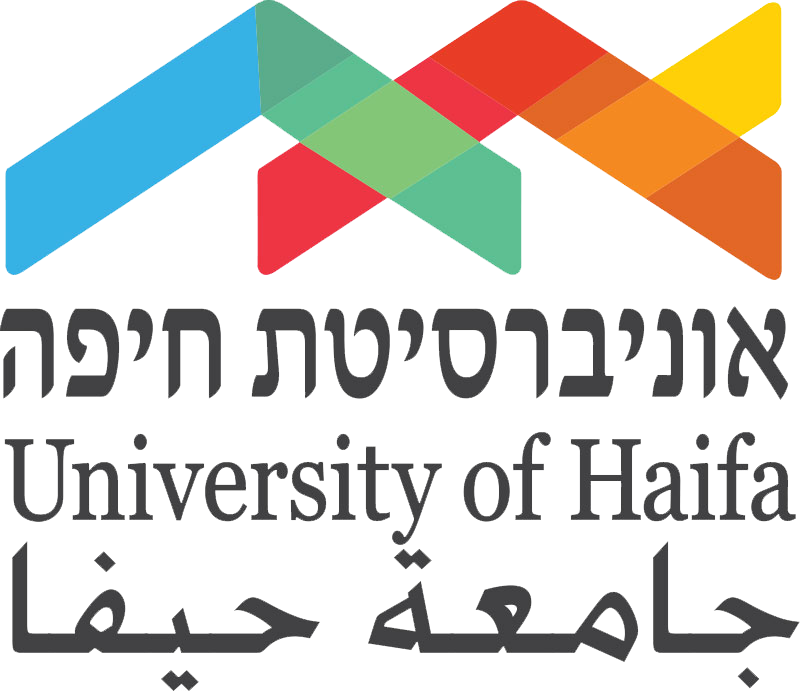Muhammed Ammash’s Story: A graduate of PCM, living in Turkey
Genevieve Begue: A Graduate of PCM working in Jisr A-Zarqa
Maya Goldring Hadar: a PCM graduate studying for a Phd at the university of Konstanz, Germany
Muhammed Ammash’s Story: A graduate of PCM, living in Turkey
by Greta Richter and Breny Aceituno
A complex identity is the first sense that arises when speaking to Muhammed Ammash. It is not, however, because he betrays his confidence or questions his being of some sort- On the contrary, he is quite easy to talk to and readily gives you his opinion with a smile.
Rather the sense derives when meeting Muhammed. For one cannot help but notice the settings, or perhaps just overall context of his ‘being’. That is, Muhammed is a Turco-Palestinian man working and living in Istanbul, who was born in a small Arab village called Jisr-az-Zarqa off the central coast of Israel. He is also a graduate of the Peace and Conflict Management (PCM) Masters Program at Haifa University, of course; and he is quite an outstanding one.
At age 29, Muhammed is working for a think-tank called Global Political Trends Center (GPoT Center) at Istanbul Kultur University. He particularly works with Armenian and Turkish relations as well as with the conflict in Cyprus. In describing his work, Muhammed says, “the think tank befits the name - what I mostly do during the day is thinking, researching, and writing. However, our work also involves some other activities - such as organizing events in which we deal with different details for various tasks.” He seems to also enjoy the academic setting of his organization, even though academia setting is not always as poised as it pretends to be - think of noisy undergraduate students.
Muhammed is most-definitely one of the program’s most accomplished graduates. And yet his unique and complex identity (i.e. cultural identity vs national identity vs linguistic identity) is what makes Muhammed really stand out from other graduates of the PCM Studies Program. To be more specific, Muhammed’s many identities — think of them as various masks, each as distinct as the other — not only allow him to have a more wide-ranged perspective on conflicts, but also, enable an ability to see and often accept the various narratives in a conflict. Narratives which most people otherwise have difficulty comprehending.
For example, living in Turkey and being half Turkish, Muhammed appears to whole-heartedly understand the Turkish perspective of Israel regarding its misjudgement of its muslim population. Similarly, growing up in a poverty-stricken and often neglected Arab town in Israel, he understands the grievances felt by many Palestinian citizens of Israel regarding the state’s infamous protocol. And yet, Muhammed, as an Israeli citizen who grew up speaking Hebrew as if it were his mother-tongue, also accepts and understands the historic narrative of Israel. In other words he seems to be aware of the complexities of the land of Israel/Palestine - a land which many identity masks, too, exist.
Nevertheless, Muhammed will be the first to admit that ‘understanding’, despite the complexity of his identity, is not a natural trait. He did not and does not always easily understand and accept a narrative of a conflict; and in fact, it was the course in the PCM program which allowed him to really grasp the concept of narratives in a conflict.
“Many courses in the PCM Studies helped me better understand the phenomenon of conflict and more specifically, the conflict in Israel. However, one course, specifically the Multi-track Diplomacy Workshop with Professor Kaufmann, was most insightful. During several sessions, it allowed the participants, including myself, to engage in a broad range of conflict resolution exercises and simulations. The workshop developed our abilities to analyze the phases of a conflict; innovatively reflect on its dimensions by using new and previously-acquired techniques; and produce a proposal which is agreed upon by both parties to a conflict. ”
Additionally, Muhammed took advantage of the practicum that the PCM Studies Program coordinated and monitored. “The Mossawa organization was a hands-on experience which allowed me to see the benefits and restrictions of a human rights/civil rights organization.”
Muhammed finished the graduate degree with a graduation project which asked the question: “Do human rights organizations relieve conflict areas and allow them to grow towards a resolution?” and introduced new approaches that human rights organizations could adapt in order to contribute to resolving conflicts through a ‘theory of change’.
He is currently in liaison with Professor Eddy Kaufmann of Haifa University regarding a joint project which contributes to Israel-Turkey rapprochement.
In Turkey, Muhammed works closely with Mensur Akgun and Sylvia Tiryaki who, besides being directors at the GPoT Center and Professors at Istanbul Kultur University, “are actively involved in peacemaking activities for many years.” He enjoys most being able to constantly publish papers on peace-making and relations, more recently dealing with the relations between Israel and Turkey.
Genevieve Begue: A Graduate of PCM working in Jisr A-Zarqa
by Greta Richter and Breny Aceituno
The smell of seaside is what one first notices when visiting Genevieve's project in Jisr A-Zarqa, a coastal town near Caesaera in Israel. I met Genevieve Begue as she was giving a tour to some Israeli tourists from Jerusalem who were partaking in a “conscious” travel - that is, traveling to places in order to encourage a deeper understanding of a place and its people. This type of philosophy is definitely something that is needed in Israel and Genevieve was the first Peace and Conflict Management (PCM) student to be attracted to the opportunity in Jisr. The truth is, when going to the town for the first time, it is difficult to not be drawn into its beauty. The town has such an easy-going beachy feel, despite it’s poverty-stricken population of 14,000.
Genevieve started officially working at the village in March of 2015 . However, before she even knew of Jisr, she was a student at the Peace and Conflict Management program in Haifa University. During her courses, while building her theoretical background and interacting with other students in the program, she became familiar with Jisr A-Zarqa and it’s uniqueness. By uniqueness, I mean that Jisr a-Zarqa is the only Arab town on the coast, meaning it was not forcibly displaced in 1948. Unfortunately not many Israelis visit Jisr or even know of the coastal Arab town; and this due to the Israeli prejudice that correlates Arab towns with poverty and violence. Genevieve, in this sense, is an exception to the norm.

Genevieve started volunteering at Jisr in March of 2013, and helped organize the guest center with Neta, a young Jewish lawyer, and Ahmad, a town resident; however, Genevieve believes the term “leader” would apply well to Ahmad, for he initially had the idea to make the town a socially conscious tourist attraction. The guesthouse allows visitors to stay in the town overnight, and thus really immerse with the place and the people. Since becoming an official employee for the Jisr eco-tourist project, Genevieve has spent much of her time focusing on the town’s gallery where she gets crafty with the children of the town making necklaces and upcycling projects. Specifically, Genevieve focuses on teaching leadership as well as entrepreneurship to the children, through a process of upcycling. Genevieve says, “from the creation of a product to its marketing, we raise awareness on the massive amount of uncollected trash in the village, which is simply burned by the residents”. She also teaches English to the children who have been adapting really quickly to the new language- “Mahmood for example”, Genevieve says, “now leads tours for visitors and tourists”.
The ultimate aim that Genevieve believes she can achieve in Jirs is “truly to empower youths and women of the village, to encourage and support new initiatives to change the face of their village while building a better future for themselves, to get them out of the “victim” status in which they fell or were put and to help them build a vision for themselves.” Genevieve wants to demonstrate the potential of a shared society that there could exist in Israel between its Jewish and Arab-Palestinian citizens, while simultaneously helping the the Israelis overcome the stigma that they have assigned to Jisr.
When speaking to Genevieve of the Peace and Conflict Management Program, she says, “one class I took during the first semester inspired me and encouraged me to sign up for this long term commitment with Neta, which eventually culminated in my hiring in Jisr. The Leadership in Conflict course I followed with Ran Kuttner first taught me, then allowed me to recognize in Neta a mentor I wanted to follow”.
Maya Goldring Hadar: a PCM graduate studying for a Phd at the university of Konstanz, Germany
by Greta Richter and Breny Aceituno
Already at first glance, Maya appears to be a very committed young woman with a very impressive Resume. She is one of the graduates of the Peace and Conflict Management Master Program, but. her academic career started much earlier. Maya holds an LLB (bachelor in law) which she studied both at the University of Haifa and at Bucerius law school in Hamburg, Germany. Maya’s fascination with Germany indeed led her back there on numerous academic occasions.
Maya holds a Master in International Law and Human Rights which she pursued following her position as a lawyer and officer in the IDF. In 2013, Maya completed her second Masters (MA in Peace studies and Conflict Management) and proceeded to a third Master in German and European Studies following her interest in German and European politics. Maya is currently writing her PhD dissertation within the Graduate School of Decision Science at the University of Konstanz. The topic of her dissertation can indeed be traced back to her work in the IDF as well as her background in political science and peace studies since it deals with post-conflict societies and the changing effect of war outcome on social identification, polarization and the recurrence of conflict.
All through her MA studies, Maya served as a lawyer and officer in the IDF. She served as a Military Prosecutor in the Justice Advocate General Unit and was stationed in the Samaria Area (West Bank). Later in her professional career, she served as a legal advisor in the West Bank as well. Maya finished her military service with a Captain’s rank. Aside from her position with the IDF, during her studies Maya also interned at an NGO called “Shatil” which attends to Civil and Social Rights, Diversity, Multicultural Cities, Jewish-Palestinian Co-existence.
Even though Maya had already gained extensive professional experience in the field of law, she reported acquiring new knowledge in peace and conflict resolution during her PCM studies. Maya specifically benefited from the “Great Power Intervention” seminar, taught by Prof. Benjamin Miller, the workshop on Multi-Track Diplomacy facilitated by Prof. Kaufman and the research methods course taught by Dr. Lutmar. Maya successfully linked her PCM masters to her experiences in the IDF as well as to her current academic position. To date, Maya holds several research positions at the university of Konstanz and employed as a managing editor for the well know “International Interactions” journal.














